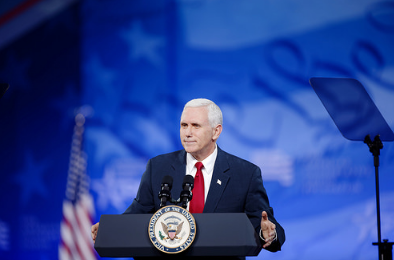Canada News
Pence tells Canada, allies to give frozen Maduro assets to Venezuelan opposition

Pence called on Canada and its Lima Group allies to transfer the money in a speech at their summit in Colombia, where Foreign Affairs Minister Chrystia Freeland and Canada’s hemispheric allies are discussing the ongoing crisis in Venezuela. (File Photo: Michael Vadon/Flickr, CC BY 2.0)
OTTAWA — U.S. Vice President Mike Pence’s call to allies on Monday to give frozen Venezuelan assets to anti-Maduro forces could pump billions into the coffers of the country’s pro-democracy movement, say Canadian analysts.
Pence called on Canada and its Lima Group allies to transfer the money in a speech at their summit in Colombia, where Foreign Affairs Minister Chrystia Freeland and Canada’s hemispheric allies are discussing the ongoing crisis in Venezuela.
Pence announced new sanctions on supporters of Venezuela’s socialist leader Nicolas Maduro, as the U.S., Canada, its Latin American allies in the Lima Group and dozens of other countries seek to propel opposition leader Juan Guaido into power.
The Washington think-tank Inter-American Dialogue and the Centre for International Governance Innovation in Waterloo, Ont., have proposed repurposing the billions of dollars of assets seized from Venezuela’s corrupt leaders to help countries coping with Venezuelan refugees and to support Guaido’s new government.
Fen Hampson, the executive director of the World Refugee Council and the head of CIGI’s global security program, said Pence’s proposal is a step towards that.
“There are millions approaching billions in frozen assets of Maduro and his henchmen in U.S. banks and elsewhere. Those ill-gotten gains should be repurposed to help the victims of his policies, including the three million Venezuelans who have been forced to flee political persecution and economic deprivation,” said Hampson.
“This is something that the Lima Group countries could also do themselves in co-operation with the U.S.”
Ben Rowswell, a former Canadian ambassador to Venezuela, said the suggestion is “a promising policy prescription” that would help the international community raise the estimated $30 billion that will ultimately be needed to rebuild the country’s economy.
Other countries need to start talking about a rescue package to rebuild the country’s economy, which has shrunk by half, “to show the seriousness, resolve and long-term commitment to the democratic restoration of Venezuela,” said Rowswell, the president of the Canadian International Council.
“My understanding from following the World Refugee Council is that they have had quite extensive international legal expertise informing that advice, and it is entirely doable to have international assets of sanctioned individuals like Maduro and his cronies, seized,” said Rowswell.
“This is a groundbreaking area of international jurisprudence ? but it makes eminent sense as a policy prescription.”
Three weeks ago, when Canada hosted the last Lima Group meeting, its cornerstone recommendation was to urge Venezuela’s military to switch allegiance and support opposition leader Guaido as the true leader of their country.
So far that hasn’t happened, but Rowswell and other analysts say there are still signs it eventually could.
Last weekend, an estimated 170 Venezuelan soldiers defected after clashes on the borders of Colombia, where pro-democracy supporters were escorting trucks filled with food and medical supplies, said Ivan Briscoe, the program director for Latin America for the International Crisis Group.
That may be a small number given the combined size of Venezuela’s security forces is about 200,000 people, but it is not insignificant, said Briscoe.
“The desertion we’re seeing at the moment is a slow erosion and it’s not certain whether it would actually generally turn into a sufficient move to actually weaken the regime,” said Briscoe. “That said, there is no doubt that discontent is great.”





















